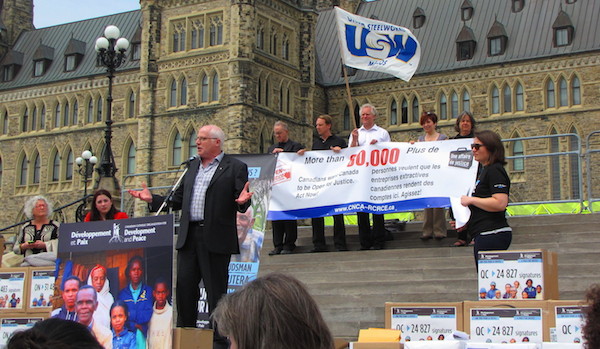On May 14th, Development and Peace and other members of the Canadian Network on Corporate Accountability (CNCA) came together with supporters on Parliament Hill to call for the creation of an impartial and independent Ombudsman to hear complaints from people who have been harmed by the activities of Canadian extractive companies operating internationally.

The rally was attended by some 300 supporters. Development and Peace presented Members of Parliament with more than 85,000 signatures on postcards from Canadians who support the call for an extractive sector Ombudsman. Another 13,500 signatures were gathered by CNCA member organizations Inter Pares, Amnesty International, United Steelworkers, and Kairos. These signatures support both the creation of an Ombudsman, as well as the creation of better access to Canadian courts for people from other parts of the world who feel they have been harmed by a Canadian extractive company.
Several MPs joined in the noon-hour rally to address the crowd and show their support for the creation of an Ombudsman. Speakers included MPs Ève Péclet (NDP), Irwin Cotler (Liberal), Jean-François Fortin (BQ), and Green Party representative Lorraine Rekmans. Liberal MP John McKay was also present to show his support. McKay’s private member’s bill C-300, which also sought to create a mechanism to receive complaints about the activities of Canadian extractive sector companies overseas, went down to defeat by just 6 votes in 2010.
The CNCA’s “Open for Justice” campaign recognizes that people who have been harmed by the activities of Canadian extractive companies operating overseas often do not have access to effective judicial or non-judicial mechanisms to seek redress in their own countries. The campaign therefore seeks to enhance access for these people to Canadian courts, as well as the creation of an independent extractive sector ombudsman in Canada that will be empowered to investigate complaints, report out on the findings of investigations, provide mediation, make recommendations regarding remedy for people who have been harmed by a Canadian extractive company operating overseas, and, if needed, recommend that the government of Canada withhold political and financial support to a company.